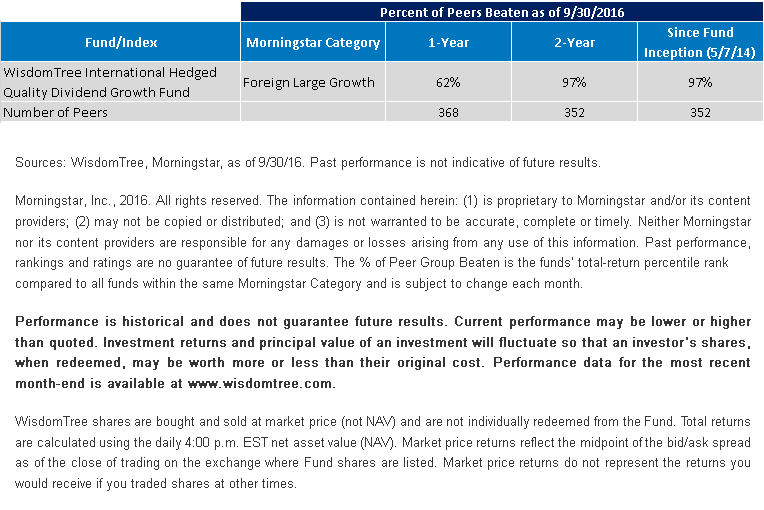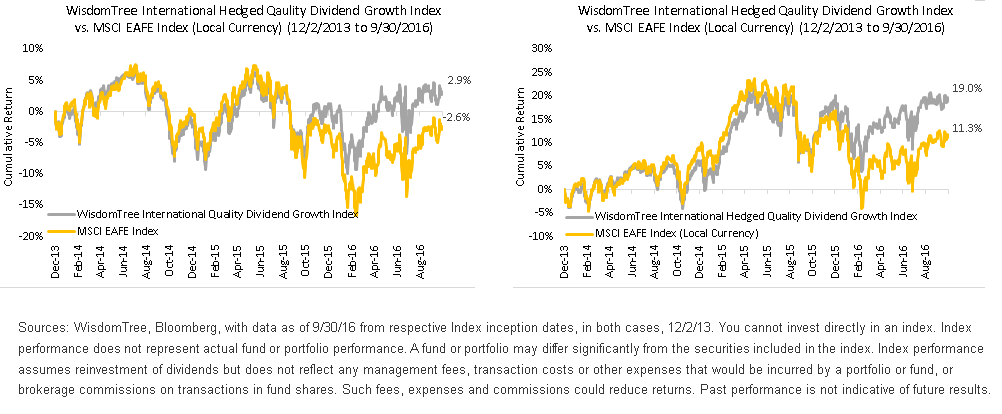The Latest Dynamic FX Hedged ETF: An International Quality Strategy


Among the investment factors gaining traction in recent years has been the quality factor. We often refer to our quality Indexes as an implementation of a Warren Buffett-lite and -like screening process. A passage in Buffett’s latest annual letter reveals how he thinks about attractive investment options. A key feature of companies that make good acquisition candidates for Berkshire Hathaway are “businesses earning good return on equity (ROE) while employing little or no debt.”
WisdomTree offers a series of U.S., international and emerging market Indexes—our Quality Dividend Growth family—that employ this “Buffett factor” of return on equity and return on assets (ROA) as a driving force for stock selection. The reason we included ROA in powering stock selection is that it penalizes the use of debt (leverage) in delivering ROE; therefore, the resulting list of companies that qualify for our Indexes also tend to employ little debt.
While Buffett will always be a master stock picker, he also has advocated index investing for both his legacy asset base and as a generally sound philosophy for individual investors.
Time to Look Abroad?
After a decade of U.S. equity market outperformance, it may be time for the developed world to outperform over the next decade. Once an investor decides to allocate more weight to international stocks, there are a number of important follow-up questions on implementation: Should one invest by region? Tilt weight to various size segments? Take foreign currency risk?
Emphasizing Quality Leads to Unique Exposures
We believe the emphasis on quality measures is a critical distinguishing factor for the WisdomTree International Quality Dividend Growth Index that enables us to identify and avoid companies that are using excessive leverage to achieve their return on equity. This results in having an under-weight to Financials. Conversely, Consumer Staples and Consumer Discretionary receive greater over-weights, as they typically have higher return-on-equity and return-on-assets metrics.
Dealing with Uncompensated Currency Risk
Since 2009, WisdomTree has focused on a critical topic related to developed international equities: the uncompensated risk of currency. Over long periods, foreign currencies have moved in broad, sweeping trends compared to the U.S. dollar—sometimes adding to and other times detracting from unhedged international equity returns.
The typical experience has been one of increased risk with only a small chance of incrementally enhancing returns.
WisdomTree launched the full currency-hedged version of its international quality strategy first in an exchange-traded fund (ETF) format in 2014.
This ETF, the WisdomTree International Hedged Quality Dividend Growth Fund (IHDG), now has a 2.5-year track record. Since its inception, it has beaten 97% of its international peers. Click here for standardized performance of IHDG.

Value Added from Quality Approach
Part of the value add of this Fund was driven by the stock selection, and part of it was driven by the currency hedge, which the vast majority of international mutual funds still do not incorporate systematically.
Pushing the innovation envelope further, WisdomTree now has an unhedged option and a fully hedged option, in addition to its latest launch of the WisdomTree Dynamic Currency Hedged International Quality Dividend Growth Fund (DHDG), which incorporates a dynamic currency-hedged approach on top of the equity exposure. We’ll get into the motivations for the dynamic hedge below, but first a breakdown of equity performance unhedged and fully hedged.
Figure 2 indicates the cumulative performance for those unhedged and fully hedged Indexes.
Figure 2: What Has the Performance Picture Shown?

For definitions of indexes in the chart, visit our glossary.
Why Dynamic Hedge?
While we can advocate strongly that passive hedging can help reduce volatility of a broad international equity strategy, a number of investors worry about lagging the older, unhedged funds when currencies such as the euro are appreciating in value. So one question we sought to answer is this: Could we lower hedge ratio and take on currency exposure when it is more attractive to do so?
WisdomTree partnered with Record Currency Management Ltd. (Record) to use its currency research and currency signals in order to dynamically hedge currency exposures. Record has been in the business of managing currency-hedging strategies and overlays since 1983, and throughout this period of more than 30 years, it has focused solely on the risk/reward trade-offs in the currency markets.
A first step to developing a currency model is to carefully specify the signals that will be used. Adjustments to WisdomTree’s currency hedge and how much to hedge are the result of a rules-based, well-researched and codified process developed in conjunction with Record.
At the October hedge rebalance, the WisdomTree Dynamic Currency Hedged International Quality Dividend Growth Index had an approximate hedge ratio for the combined currency exposures of more than 70%. Some of the individual hedge ratios are the euro (83.3%), the British pound (83.3%) and the yen (50%). More information on how these signals are determined can be found here.
WisdomTree now has five ETFs that incorporate this dynamic hedging process, and as discussed here, dynamic hedging has added value over both traditional unhedged and fully hedged strategies in the live start in 2016.
WisdomTree anticipates that a growing number of investors will determine that they are taking too much unnecessary currency risk in their unhedged international equity strategies and increasingly will begin to adopt either full static hedged or dynamically hedged strategies.
Important Risks Related to this Article
There are risks associated with investing, including possible loss of principal. Foreign investing involves special risks, such as risk of loss from currency fluctuation or political or economic uncertainty. The Fund invests in derivatives in seeking to obtain a dynamic currency hedge exposure. Derivative investments can be volatile, and these investments may be less liquid than other securities, and more sensitive to the effects of varied economic conditions. Derivatives used by the Fund may not perform as intended. A Fund that has exposure to one or more sectors may be more vulnerable to any single economic or regulatory development. This may result in greater share price volatility. Dividends are not guaranteed and a company currently paying dividends may cease paying dividends at any time. The composition of the Index underlying the Fund is heavily dependent on quantitative models and data from one or more third parties, and the Index may not perform as intended. The Fund invests in the securities included in, or representative of, its Index regardless of their investment merit, and the Fund does not attempt to outperform its Index or take defensive positions in declining markets. Please read the Fund’s prospectus for specific details regarding the Fund’s risk profile.No WisdomTree Fund is sponsored, endorsed, sold or promoted by Record Currency Management (“Record”). Record has licensed certain rights to WisdomTree Investments, Inc., as the index provider to the applicable WisdomTree Funds, and Record is providing no investment advice to any WisdomTree Fund or its advisors. Record makes no representation or warranty, expressed or implied, to the owners of any WisdomTree Fund regarding any associated risks or the advisability of investing in any WisdomTree Fund.
Hedging can help returns when a foreign currency depreciates against the U.S. dollar, but it can hurt when the foreign currency appreciates against the U.S. dollar.

Jeremy Schwartz has served as our Global Chief Investment Officer since November 2021 and leads WisdomTree’s investment strategy team in the construction of WisdomTree’s equity Indexes, quantitative active strategies and multi-asset Model Portfolios. Jeremy joined WisdomTree in May 2005 as a Senior Analyst, adding Deputy Director of Research to his responsibilities in February 2007. He served as Director of Research from October 2008 to October 2018 and as Global Head of Research from November 2018 to November 2021. Before joining WisdomTree, he was a head research assistant for Professor Jeremy Siegel and, in 2022, became his co-author on the sixth edition of the book Stocks for the Long Run. Jeremy is also co-author of the Financial Analysts Journal paper “What Happened to the Original Stocks in the S&P 500?” He received his B.S. in economics from The Wharton School of the University of Pennsylvania and hosts the Wharton Business Radio program Behind the Markets on SiriusXM 132. Jeremy is a member of the CFA Society of Philadelphia.

